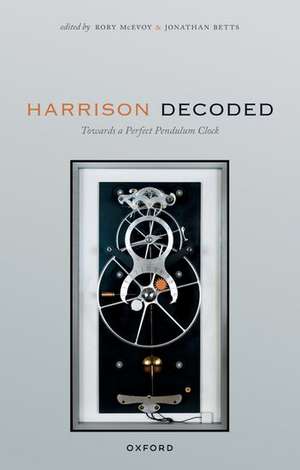Harrison Decoded: Towards a Perfect Pendulum Clock
Editat de Rory McEvoy, Jonathan Bettsen Limba Engleză Paperback – 29 iun 2023
| Toate formatele și edițiile | Preț | Express |
|---|---|---|
| Paperback (1) | 244.06 lei 10-16 zile | +61.14 lei 4-10 zile |
| OUP OXFORD – 29 iun 2023 | 244.06 lei 10-16 zile | +61.14 lei 4-10 zile |
| Hardback (1) | 496.64 lei 10-16 zile | |
| OUP OXFORD – 28 apr 2020 | 496.64 lei 10-16 zile |
Preț: 244.06 lei
Preț vechi: 288.61 lei
-15% Nou
Puncte Express: 366
Preț estimativ în valută:
46.71€ • 48.49$ • 38.95£
46.71€ • 48.49$ • 38.95£
Carte disponibilă
Livrare economică 21-27 februarie
Livrare express 15-21 februarie pentru 71.13 lei
Preluare comenzi: 021 569.72.76
Specificații
ISBN-13: 9780198892670
ISBN-10: 0198892675
Pagini: 208
Ilustrații: 82 illustrations
Dimensiuni: 138 x 215 x 13 mm
Greutate: 0.3 kg
Editura: OUP OXFORD
Colecția OUP Oxford
Locul publicării:Oxford, United Kingdom
ISBN-10: 0198892675
Pagini: 208
Ilustrații: 82 illustrations
Dimensiuni: 138 x 215 x 13 mm
Greutate: 0.3 kg
Editura: OUP OXFORD
Colecția OUP Oxford
Locul publicării:Oxford, United Kingdom
Recenzii
This is an intriguing book that anyone interested in clocks and their history will enjoy.
Revolutionary work.
The essays in this fascinating book effectively chart the progress of an extraordinary experiment, conducted over decades but with a recent, and very remarkable outcome
Combining historical context, technical details and experimental information, this well-illustrated edited collection describes the challenges as well as the delights of historical reconstruction.
The authors provide a wonderful vindication of a native genius, following the original work of Martin Burgess. They give us an explanation of an alternative technology to the one accepted for the past 300 years, when it comes to the design of a mechanical precision timekeeper.
This authoritative and accessible collection of essays tells the fascinating story of [the great clockmaker John Harrison], and how Harrison's enigmatic and astute eighteenth-century account of high-reliability pendulum motion and timekeeping was at last vindicated.
Revolutionary work.
The essays in this fascinating book effectively chart the progress of an extraordinary experiment, conducted over decades but with a recent, and very remarkable outcome
Combining historical context, technical details and experimental information, this well-illustrated edited collection describes the challenges as well as the delights of historical reconstruction.
The authors provide a wonderful vindication of a native genius, following the original work of Martin Burgess. They give us an explanation of an alternative technology to the one accepted for the past 300 years, when it comes to the design of a mechanical precision timekeeper.
This authoritative and accessible collection of essays tells the fascinating story of [the great clockmaker John Harrison], and how Harrison's enigmatic and astute eighteenth-century account of high-reliability pendulum motion and timekeeping was at last vindicated.
Notă biografică
Rory McEvoy has worked in horology for over twenty years. Following a postgrad diploma at West Dean College, Chichester, he practiced in conservation of antique clocks and watches before joining a London auctioneer as a specialist. Since 2010, he has worked at the Royal Observatory as Curator of Horology. Research interests include: timekeeping and astronomy, the development of the precision pendulum clock with particular focus on the work of George Graham FRS and the historical practice of measuring time in the laboratory.Jonathan Betts MBE, FSA, FBHI, FIIC, FRSA was appointed Senior Horology Conservator at the NMM in 1979, and Senior Curator of Horology in 2000. He is Vice Chairman of the Antiquarian Horological Society, is a Past Master of the Worshipful Company of Clockmakers (2014) and a Trustee of the Institute of Conservation. In 1989 he received the NMM Callender Award, in 2002 the Clockmakers' Company's Harrison Gold Medal, in 2008 the BHI Barrett Silver Medal and in 2013 the Plowden Medal (RWHA) for his contribution to Horology Conservation.
